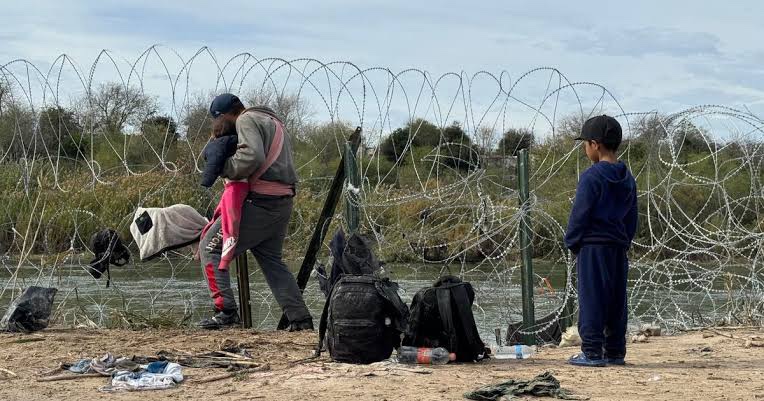Migrants cross U.S. border in record numbers, undeterred by Texas’ razor wire, Biden’s policies

A record number of migrants have crossed the U.S. border, undeterred by Texas’ razor wire barriers and the Biden administration’s policies. By 6:30 a.m., scores of migrants, including parents with young children, were seen navigating through razor wire near the Rio Grande, pleading for safe passage into the U.S.
The Texas National Guardsmen, armed with rifles, attempted to manage the situation, urging migrants in broken Spanish to turn back for safety reasons. Despite the guardsmen’s efforts, the migrants pressed on, overcoming obstacles like concertina wire. Remarkably, the Guardsmen, lacking authority to enforce federal immigration law, could only direct the migrants to walk along a dirt road for processing by absent Border Patrol agents.
This scenario, now a daily occurrence near the Texas border town of Eagle Pass, reflects an escalating crisis. The region has become the busiest sector for illegal crossings, surpassing even the remote Tucson sector in Arizona. The surge, undeterred by razor wire, federal border walls, and Biden administration policies, has strained resources in communities across the U.S., from small towns to major cities, reshaping the immigration discourse and putting Democrats on the defensive ahead of the 2024 election.
In response to this crisis, the White House and Senate Democrats are exploring measures, including drastic limits on asylum, and an expansion of detention beds and deportations, to gain Republican support for additional aid to Ukraine. Negotiations are ongoing in Congress, with lawmakers signaling a desire to reach a deal in the coming weeks.
The Border Patrol’s Del Rio sector, encompassing Eagle Pass, has witnessed a record-high processing of up to 4,000 migrants in 24 hours. This surge, far beyond historical norms, has left local officials and communities grappling with the unprecedented scale of illegal border crossings.
Eagle Pass fire chief Manuel Mello, recalling past border challenges, expressed disbelief at the current situation, stating, “Groups of 10, 12 — that was a large group. But now you see 3,000 and 4,000 in one day. I never thought something like this could happen.”
As Border Patrol agents cope with the influx, makeshift outdoor holding areas have been established. Thousands of migrants, including families with children, endure harsh conditions while awaiting processing. The situation has prompted concerns about the well-being of infants and young children, as they face prolonged waits in challenging weather conditions.
Amidst the chaos, migrants like Andrea Diaz from Colombia shared stories of fleeing violence and threats, highlighting the difficult choices they face. Diaz and her family, who slept outdoors for two nights, expressed uncertainty about when they would be processed but remained hopeful, stating, “God willing, given all this effort.” The humanitarian and political dimensions of this crisis continue to unfold as communities grapple with the unprecedented surge of migrants.












